When ecommerce performance falls short of business goals, pinpointing the root cause is challenging. Are the marketing assets ineffective, the audience targeting poorly defined, gaps in customer support, or is it the product itself?
The complexity arises from the sheer volume of data generated daily across channels and product lines, making it difficult to unify fragmented data points and analyze them quickly enough to refine strategies.
In this article, we’ll review the 14 best analytics tools for ecommerce designed to streamline data collection, unification, and analysis, helping brands uncover ecommerce insights and optimize performance across their operations.
Key Takeaways:
- The biggest challenge for ecommerce brands is data scattered across marketing platforms, sales channels, and operational tools. The best analytics solutions unify this data for a single source of truth.
- Modern ecommerce analytics goes far beyond page views. It encompasses customer lifetime value (LTV), marketing attribution, product profitability, and the entire customer journey.
- The best tool depends on your business size, technical resources, and specific goals. This guide compares options for every need, from startups on Shopify to large enterprises.
- The ultimate goal of any analytics tool is not to generate reports, but to provide clear, actionable insights that help you increase conversions, boost average order value, and improve customer retention.
What Are Ecommerce Analytics Tools & Why Do They Matter?
At its core, ecommerce analytics is the process of gathering data from all areas of your online business and using it to make smarter decisions. This isn't just about your website. It includes data from your social media ads, email campaigns, customer support interactions, and inventory systems.
A comprehensive ecommerce analytics platform brings all these streams together, providing a 360-degree view of your operations.
Think of these tools as the central nervous system for your online store. They connect disparate data points to reveal powerful insights about what works and what doesn’t.
This is what separates thriving brands from those that stagnate.
The High Cost of Ignoring Data
E-commerce marketing moves fast. Prices change daily. Competitors adjust bids in real time. Consumer intent shifts with trends and seasonality. Without reliable analytics, decisions are made in the dark.
When data is fragmented, performance looks better than it is. Paid channels claim credit they did not earn. Underperforming campaigns stay funded. Profitable opportunities remain hidden. Budget waste becomes structural, not occasional.
Manual reporting slows reaction time. By the time a problem appears in a spreadsheet, revenue has already been lost. Optimization becomes guesswork instead of controlled execution.
Ignoring unified marketing analytics does not just reduce efficiency. It directly impacts margin, growth rate, and long-term competitiveness.
Key Benefits of Using Ecommerce Marketing Analytics Tools
Investing in the right ecommerce analytics software unlocks significant advantages. These tools empower you to move from reactive problem-solving to proactive strategy, directly impacting your bottom line.
- Deeper customer understanding: Track user behavior from first touch to final purchase. Identify your most valuable customer segments and tailor experiences to their needs.
- Optimized marketing spend: Accurately measure campaign performance. Allocate your budget to the channels and campaigns that deliver the highest eCommerce ROI.
- Improved conversion rates: Identify friction points in your sales funnel. Use A/B testing and user behavior data to optimize product pages, checkout processes, and website design.
- Enhanced product strategy: Analyze sales data to identify best-selling products and slow-moving inventory. Make informed decisions about merchandising, pricing, and stock levels.
- Increased Customer Lifetime Value (LTV): Use cohort analysis to understand customer retention. Develop targeted campaigns to encourage repeat purchases and build loyalty.
The Core Challenge: Overcoming Ecommerce Data Silos
The single biggest obstacle to effective ecommerce analytics is data fragmentation.
Your data lives in dozens of separate platforms that don't talk to each other. This creates data silos, which are isolated pockets of information that prevent you from seeing the complete picture of your business performance.
Fragmented Data from Multiple Channels
Consider a typical customer journey. A user might first see your product in a Facebook ad, then search for it on Google, read a review on a blog, and finally make a purchase after receiving an email promotion.
Each of these touchpoints generates data in a different system: Facebook Ads, Google Ads, Google Analytics, and your email platform. Without connecting them, it's impossible to understand the full path to conversion.
This challenge is where many businesses struggle. They need robust data integration solutions to consolidate information from Shopify, Amazon, Walmart, and various advertising networks into a single, cohesive view.
On top of that, you have brand lines, multiple products, and regional offices. Each of these aspects multiplies complexity by tenfold.
The Problem with Manual Reporting
To overcome silos, many teams resort to manual reporting. This involves exporting CSV files from each platform and painstakingly combining them in spreadsheets.
This process is not only incredibly time-consuming but also highly prone to human error. Data gets misaligned, formulas break, and by the time the report is ready, the information is already outdated. It's an inefficient and unreliable way to manage critical business data.
Key Features to Look For in Ecommerce Analytics Software
When evaluating different ecommerce analytics tools, certain features are critical for driving meaningful growth. Look for a platform that moves beyond simple reporting and provides a robust foundation for deep, actionable analysis.
Data Integration and Connectors
The platform's ability to connect to all your data sources is paramount. Look for a tool with a wide library of pre-built connectors for ecommerce platforms (Shopify, BigCommerce), advertising networks (Google, Facebook, TikTok), email marketing tools, and more.
The best solutions automate the complex ETL processes required to pull, clean, and load this data for analysis.
Real-Time Dashboards and Visualization
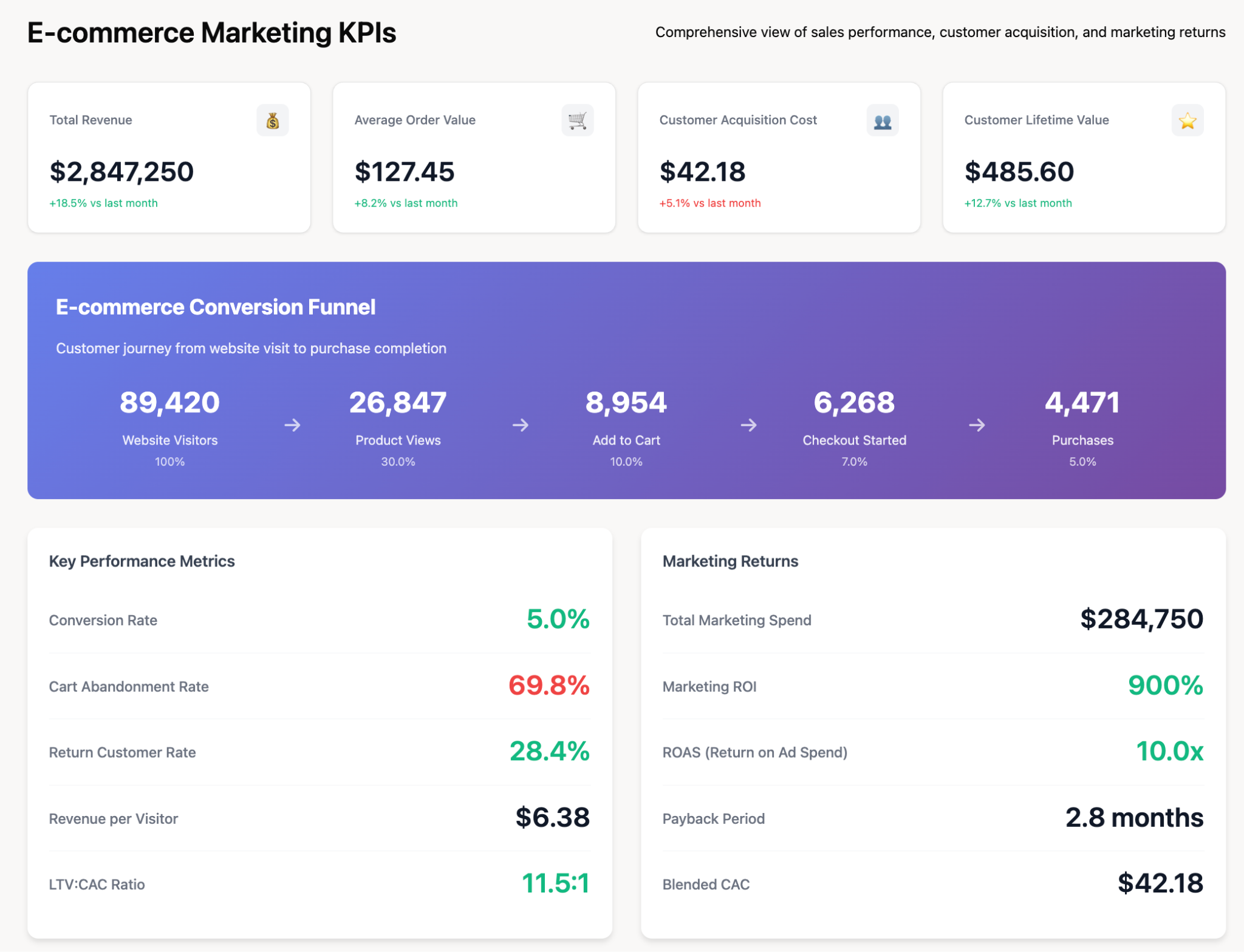
Data is only useful if you can understand it. Top-tier tools offer customizable, easy-to-read dashboards that visualize key metrics. These should be updated in near real-time, allowing you to monitor performance and react quickly to trends or anomalies.
The ability to drill down into reports is crucial for uncovering the "why" behind the numbers.
Customer Journey Mapping
Understanding the complete path a customer takes before purchasing is vital. Look for features that allow you to map and visualize multi-touchpoint journeys.
This helps you see how different channels work together to influence conversions and provides insights into where you can improve the customer experience.
Product and Sales Performance Analytics
Your tool should offer granular insights into product performance. This includes tracking sales by SKU, category, or brand. It should also help you analyze profitability, identify product bundling opportunities, and manage inventory more effectively. Metrics like average order value (AOV) and items per order are essential here.
Marketing Attribution
Which marketing efforts are actually driving sales? An effective analytics tool helps you move beyond last-click attribution. It should support various marketing attribution models, allowing you to assign proper credit to each touchpoint in the customer journey and optimize your ad spend accordingly.
1. Google Analytics
Best for: Event-based tracking and analysis of user behavior across websites and apps.
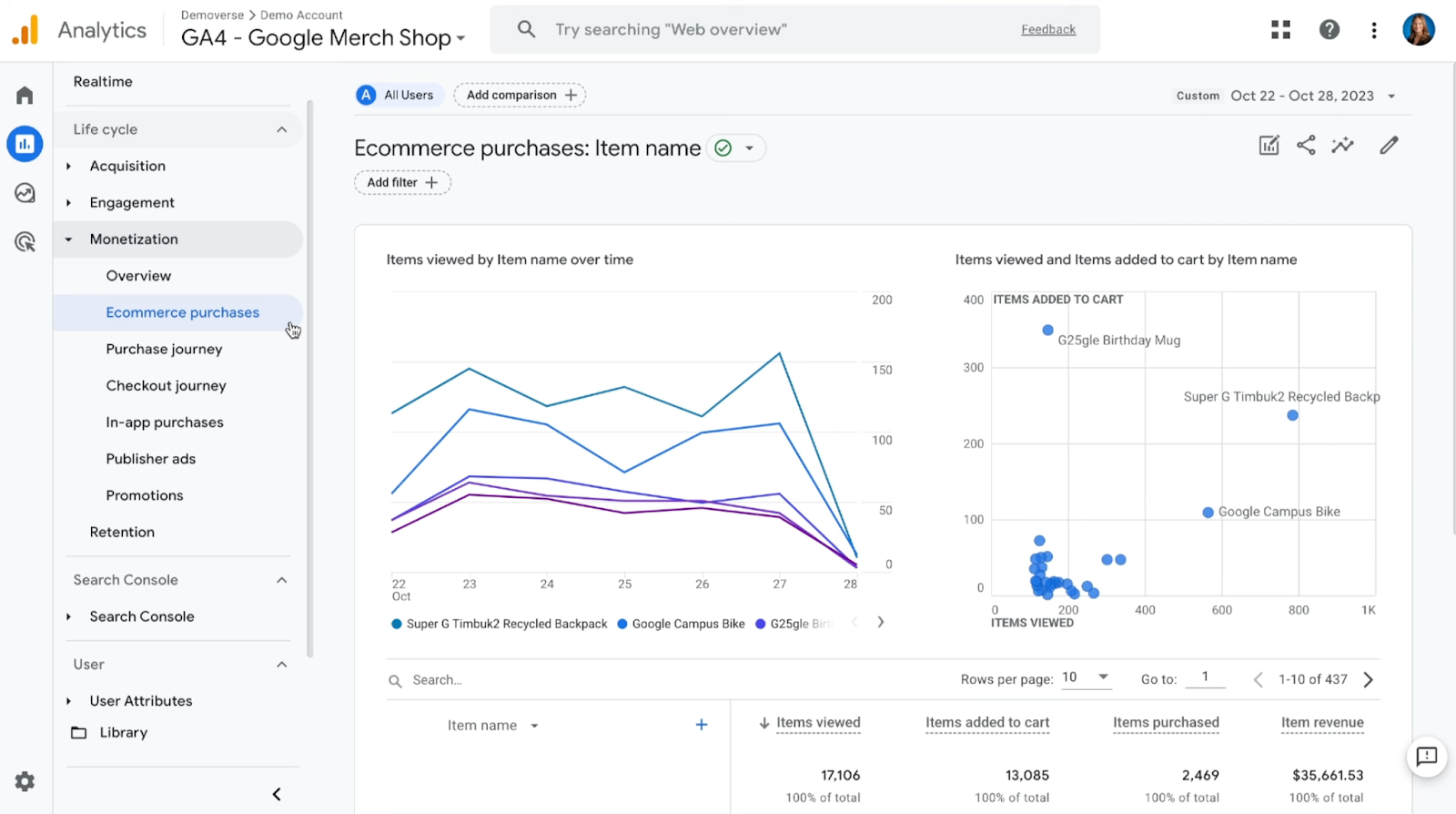
Google Analytics 4 (GA4) is a powerful tool for tracking and analyzing ecommerce performance. Its event-based tracking system provides deep insights into user behavior across websites and apps, helping brands understand their customer journey, optimize conversions, and maximize ROI.
GA4’ ecommerce-specific features:
- Event-Based Tracking: GA4’s event-driven model tracks specific user interactions, such as product views, add-to-cart events, and purchases, providing a more precise and comprehensive view of customer behavior compared to session-based tracking.
- GA4 Ecommerce Tracking: Offers dedicated ecommerce tracking capabilities, allowing businesses to monitor product impressions, promotions, checkout steps, and transactions, making it easier to identify areas for improvement in the sales funnel.
- Enhanced Ecommerce Reporting: Includes pre-configured reports on product performance, customer purchase behavior, and sales funnels, helping brands identify bottlenecks and optimize conversions.
- Cross-Platform Insights: Tracks user journeys seamlessly across devices and platforms, providing a unified view of customer behavior, critical for multi-channel ecommerce strategies.
- Predictive Analytics: Uses machine learning to generate predictive metrics like purchase probability and expected revenue, enabling businesses to anticipate customer actions and allocate resources effectively.
- Audience Segmentation: Allows ecommerce brands to create highly detailed audience segments based on purchase behavior and other interactions, enabling precise retargeting and personalization.
- Integration with Ads Platforms: Connects seamlessly with Google Ads, enabling brands to measure ad performance directly against ecommerce outcomes, such as sales and ROI.
2. Improvado
Best for: Simplifying data management, improving performance visibility, and maximizing the efficiency of their ecommerce marketing efforts.
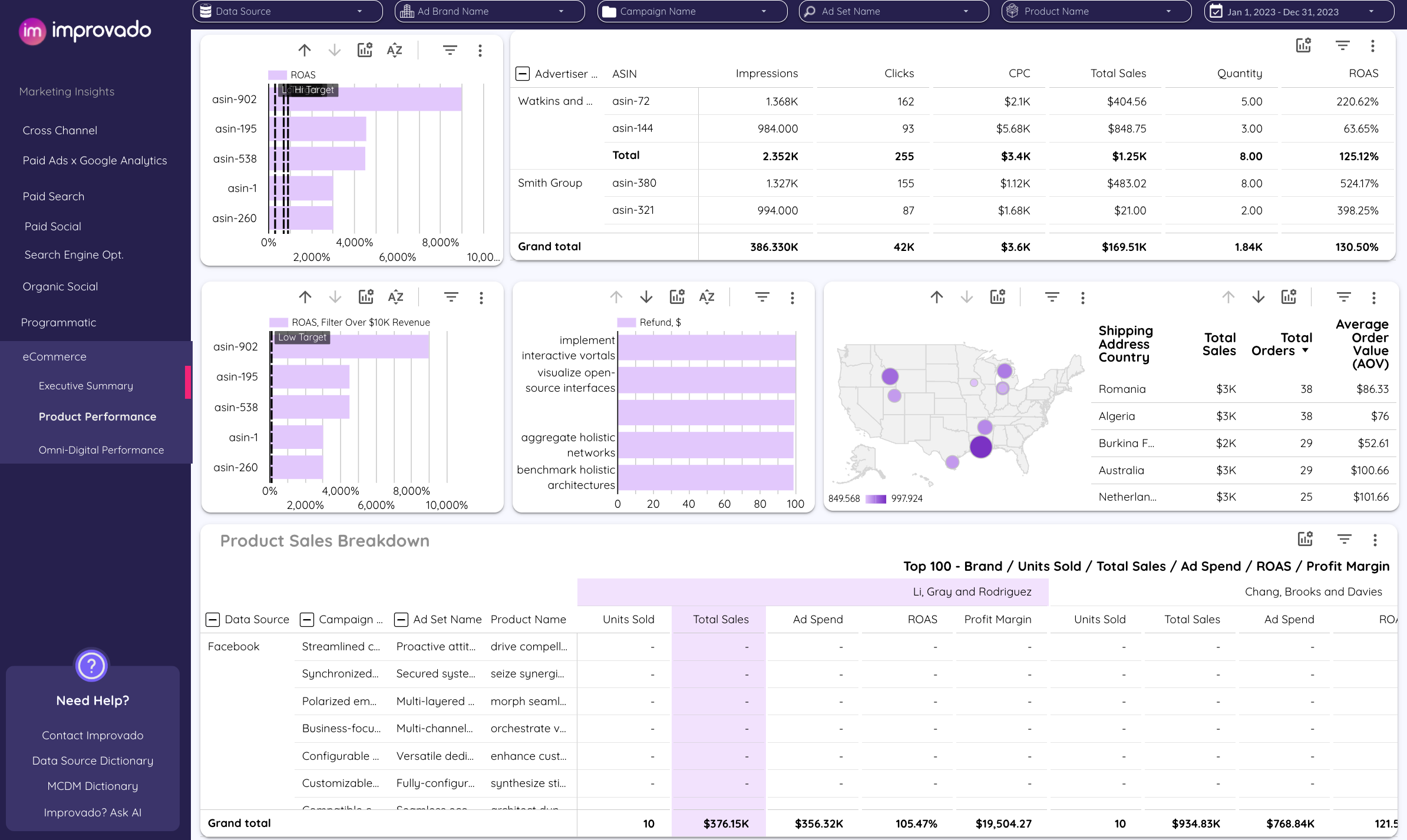
Improvado is a marketing analytics solution tailored to meet the specific needs of ecommerce businesses. The platform streamlines data collection, harmonization, and visualization, helping brands gain a holistic view of performance and optimize strategies.
Key features:
- Comprehensive Data Integration: Improvado seamlessly integrates with 500+ platforms, including major ecommerce tools like Amazon Analytics, Walmart Connect, Shopify, eBay, Awin, and custom online and offline solutions, ensuring seamless data aggregation for a complete view of performance.
- Scalable Data Harmonization: Harmonizes marketing and sales data from multiple sources into a standardized format, eliminating inconsistencies and ensuring accurate reporting across campaigns and platforms.
- Customizable Dashboards: Improvado provides pre-made dashboard templates or builds tailored dashboards to monitor key ecommerce metrics and KPIs in a setup that works specifically for your business.
- Real-Time Performance Tracking: Improvado provides a robust solution for marketing campaigns performance, brand safety, and data compliance tracking. It monitors adherence to pre-defined rules, paces metrics, and issues alerts for any anomalies, problems, or metrics drips. This solution enables ecommerce brands to adjust strategies quickly in response to market trends.
- Cross-Channel Attribution: Improvado establishes a unified tracking infrastructure that captures every customer interaction across all campaigns and channels, including granular conversion and event tracking. Using common single-touch and multi-touch attribution models and custom ones, Improvado analyzes the impact of various touchpoints, helping businesses allocate ad spend effectively and maximize ROI.
3. Glew
Best for: Analyzing ecommerce product data and customer behavior to optimize operations and increase revenue.
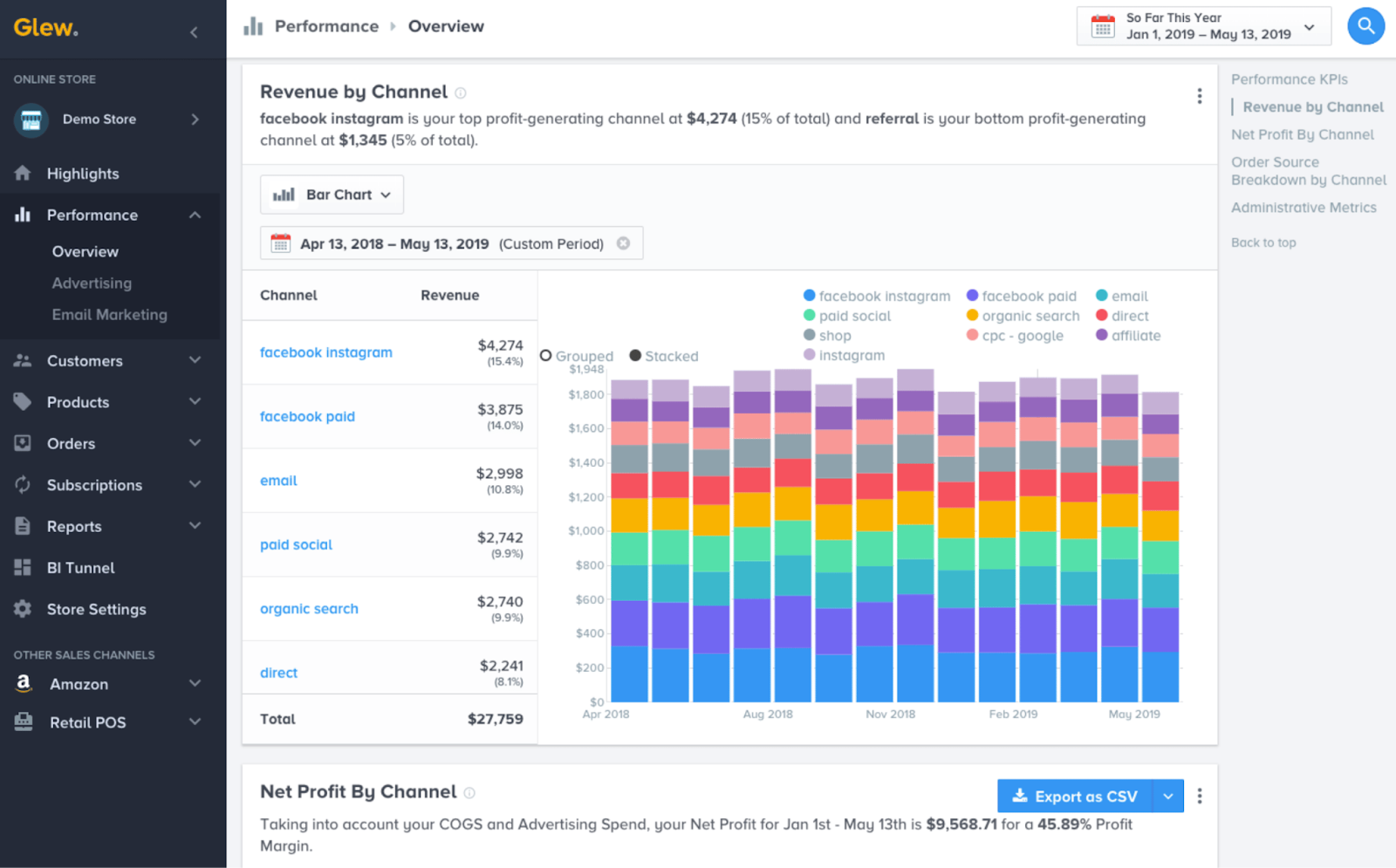
Glew is an ecommerce business intelligence and analytics platform. With industry-tailored features, it provides in-depth ecommerce insights on product performance, customer behavior, and marketing effectiveness.
Key features:
- Customer Insights: Glew offers detailed reports on customer behavior, segmentation, and lifetime value (LTV), helping brands focus on their most profitable audiences.
- Product Performance Analytics: Tracks sales, margins, and inventory for each product, enabling an ecommerce store to identify top-performing items and optimize inventory management.
- Marketing Performance Metrics: Glew provides insights into marketing ROI, campaign effectiveness, and customer acquisition costs, helping refine strategies across channels.
- Integrations with Ecommerce Reporting Software: Seamlessly connects with platforms like Shopify, BigCommerce, and WooCommerce, unifying data for easier analysis.
- Profitability Analysis: Glew breaks down profitability by product, channel, or customer segment, giving a clear picture of what drives the most value for the business.
- Automated Reporting: Generates customizable reports that highlight key metrics, ensuring teams stay informed without manual effort.
4. Mixpanel
Best for: Advanced real-time event-based analytics of the purchase journey.
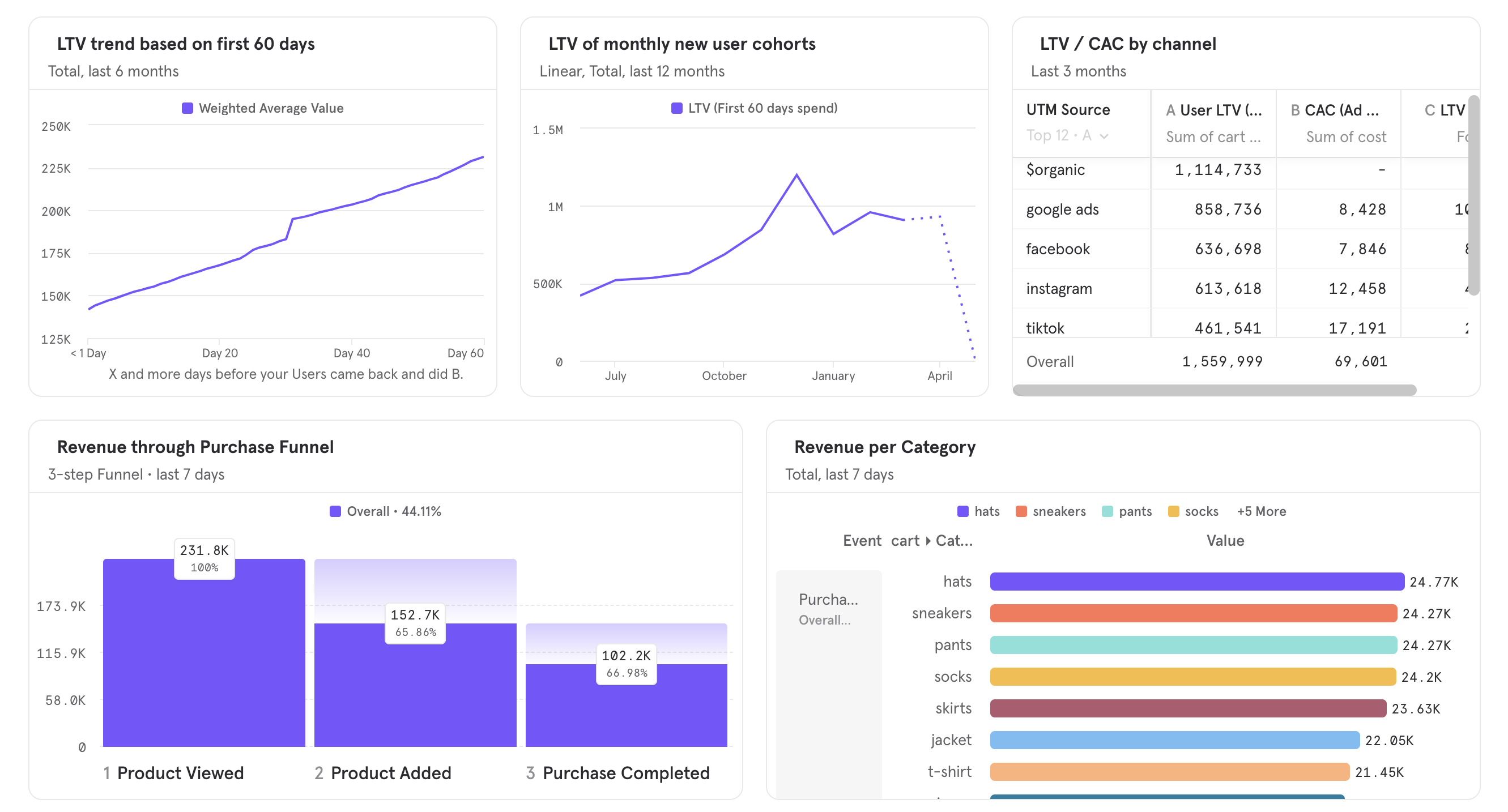
Mixpanel is a robust ecommerce analytics software solution designed to provide deep insights into ecommerce website user behavior and engagement.
Mixpanel excels in tracking and analyzing website traffic and customer actions at every stage of the purchase journey, offering granular ecommerce insights that drive data-informed decisions. Its ability to track and analyze customer cohorts and retention makes it an invaluable tool for improving lifetime value (LTV) and reducing churn.
Key features:
- Cart Analysis: Mixpanel allows businesses to examine the contents of users' carts at various stages—such as product views, additions to cart, and purchases. By analyzing details like item category, brand, and price, ecommerce brands can understand purchasing behaviors, identify popular product combinations, and strategize on upselling or bundling opportunities.
- User Journey Tracking: Mixpanel tracks detailed user actions, including product views, search behavior, cart additions, and completed purchases. This helps ecommerce brands understand how users interact with their store, identify pain points, and optimize navigation.
- Cohort Analysis: Mixpanel enables businesses to group customers based on shared behaviors, such as frequent purchases or high cart abandonment rates. This segmentation helps target high-value users with personalized offers and campaigns.
- Funnel Analysis: Offers precise visualization of user behavior through sales funnels, showing exactly where customers drop off in the journey—from browsing to checkout—enabling strategic optimizations to reduce cart abandonment.
- Customer Retention Tracking: Mixpanel tracks how often customers return to your store, offering insights into repeat purchase behavior and customer loyalty.
- Custom Dashboards and Reports: Mixpanel provides highly customizable dashboards that can display real-time metrics like average order value (AOV), customer engagement rates, and purchase trends. These intuitive dashboards are tailored to ecommerce-specific key performance indicators (KPIs) for maximum relevance.
- Event-Based Analytics: Mixpanel allows tracking of custom events such as coupon usage, failed transactions, and cart removals, offering actionable data to refine marketing strategies and improve operational efficiency.
- Ecommerce Template: Mixpanel provides a customizable template to track essential ecommerce metrics, including revenue breakdowns by product category, brand, or individual items.
5. Woopra
Best for: Analyzing customer behavior to optimize user journeys, enhance retention, and maximize revenue.
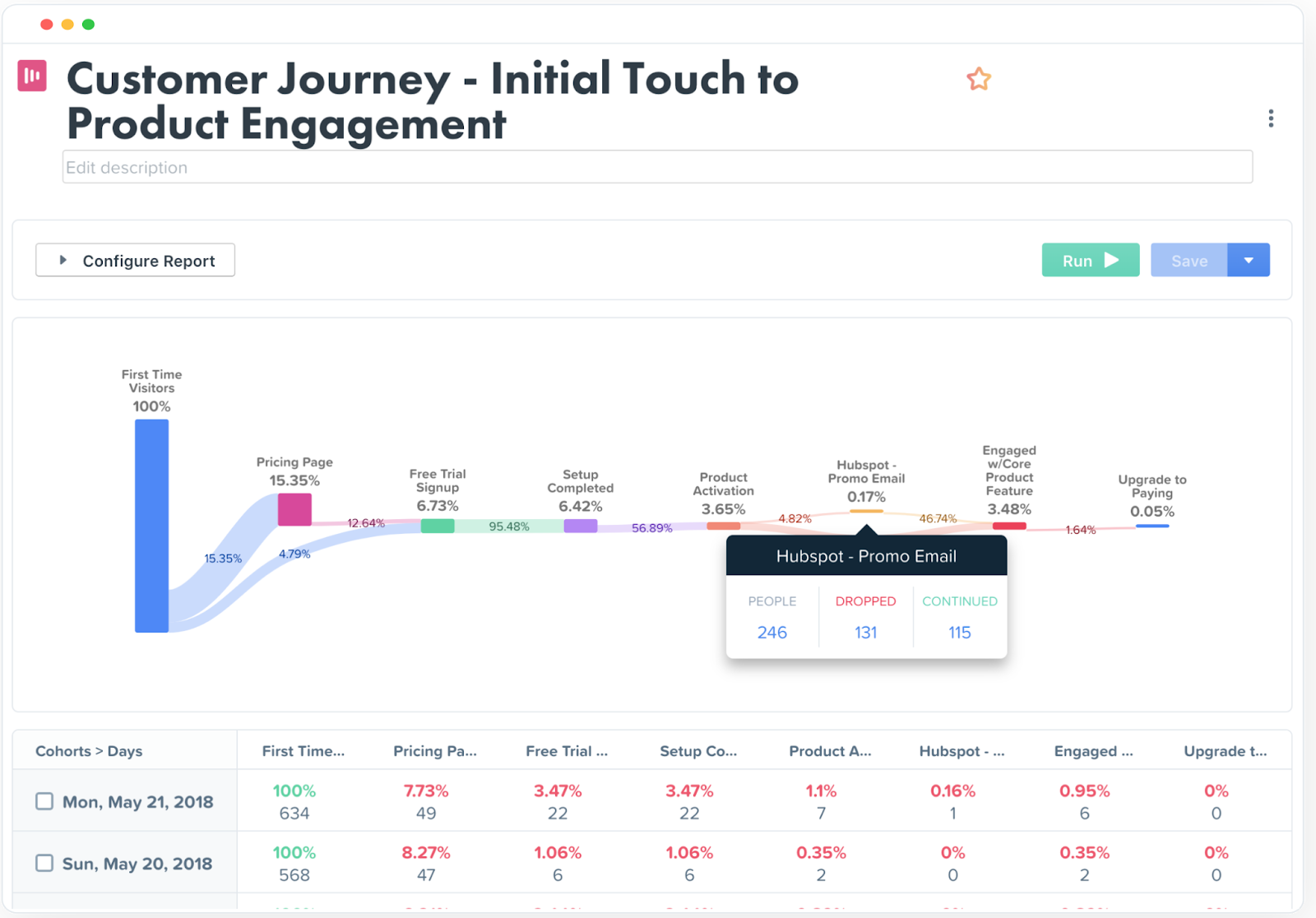
Woopra is a customer journey analytics platform that provides ecommerce businesses with real-time insights into user behavior across touchpoints. Its focus on customer journeys, segmentation, customer demographics, and retention analysis helps retailers optimize engagement, personalize experiences, and drive conversions.
Ecommerce-specific features:
- Customer Journey Mapping: Tracks user interactions across your website, email campaigns, and apps, providing a complete view of the customer lifecycle and highlighting key drop-off points.
- Real-Time Analytics: Delivers instant insights into user behavior, such as product views and cart additions, enabling timely adjustments to campaigns or website design.
- Behavioral Segmentation: Allows ecommerce brands to create detailed customer segments based on specific behaviors, such as frequent purchases or cart abandonment, for targeted marketing efforts.
- Retention and Lifecycle Analysis: Woopra tracks metrics like repeat purchase rates and customer lifetime value (LTV), helping brands identify opportunities to boost loyalty and retention.
- Integration with Marketing Tools: Seamlessly connects with Google Ads, Facebook Ads and other ecommerce analytics platforms to unify data and measure campaign performance alongside user engagement.
- Event-Based Tracking: Woopra tracks custom events, such as promo code usage or wishlist updates, providing granular insights into user interactions that inform better decision-making.
6. Optimizely
Best for: Continually testing, analyzing, and optimizing customer digital experiences.
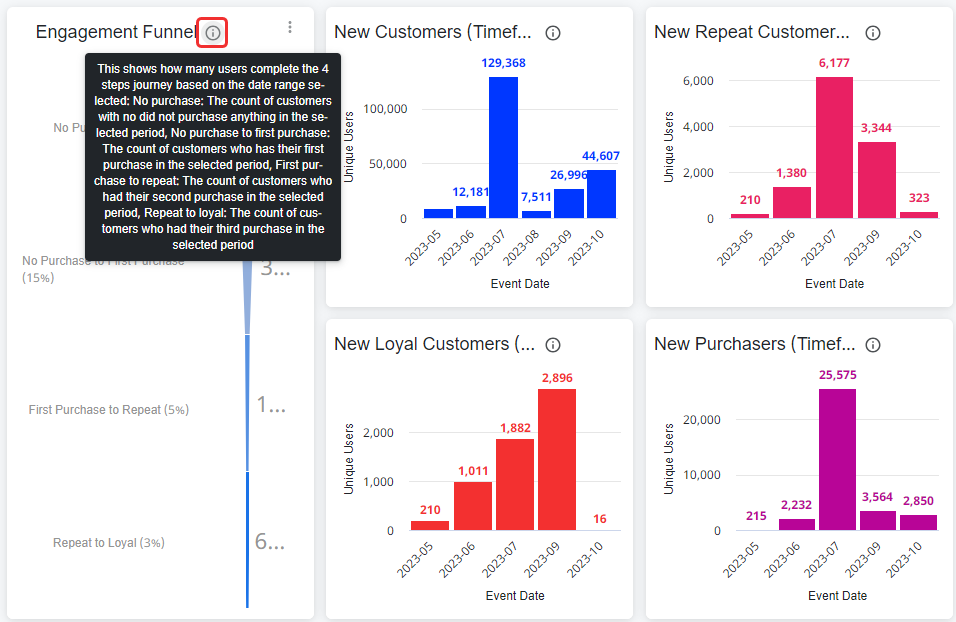
Optimizely is a leading experimentation and optimization platform that empowers ecommerce businesses to test and refine their websites, product pages, and customer experiences.
By leveraging A/B testing and personalization tools, Optimizely helps brands make data-driven improvements that increase conversions and enhance user satisfaction.
Key features:
- A/B and Multivariate Testing: Enables ecommerce businesses to test variations of product pages, CTAs, and layouts to identify designs and messaging that drive the highest conversions.
- Personalization Tools: Optimizely provides dynamic content delivery tailored to user segments, such as first-time visitors or repeat customers, ensuring more engaging shopping experiences.
- Audience Segmentation: Allows detailed segmentation based on behaviors, geography, or device usage to optimize experiences for different customer groups.
- Behavioral Insights: Tracks user interactions and identifies patterns, such as where users drop off or engage most, offering actionable data to refine site performance.
- Integrations with Analytics Tools: Seamlessly connects with other top ecommerce analytics tools like Google Analytics and CRM systems to unify testing data with broader marketing insights.
- Performance Metrics: Offers advanced analytics on experiment results, helping ecommerce brands assess the impact of changes on KPIs like conversion rate and average order value (AOV).
7. Hotjar
Best for: Uncovering usability challenges, improving site design, and creating an optimized customer journey.
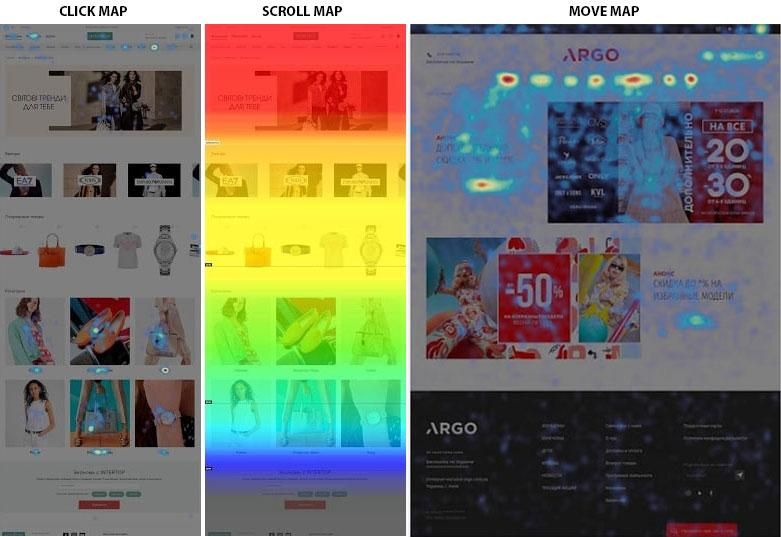
Hotjar is an ecommerce web analytics and user behavior platform designed to help ecommerce businesses gain a deeper understanding of how customers interact with their websites.
By providing qualitative insights through tools like heatmaps, session recordings, and surveys, this ecommerce analytics tool enables brands to identify usability issues, optimize site performance, and improve the customer journey to drive conversions and enhance engagement.
Key features:
- Heatmaps: Visualize user interactions, such as clicks, scrolls, and hovers, on different pages of your site. Heatmaps help pinpoint which elements attract the most attention or are ignored, offering critical insights for optimizing product pages and calls-to-action.
- Session Recordings: Hotjar allows users to replay individual user sessions to analyze navigation patterns, friction points, and unexpected behaviors during browsing and checkout. This helps detect specific issues like confusing layouts or broken links that could be deterring purchases.
- Surveys and Feedback Widgets: Deploy targeted surveys or feedback forms to gather real-time customer opinions on their experience, from product search frustrations to checkout challenges.
- Conversion Funnels: Hotjar tracks user progression through the purchase funnel to identify exact steps where drop-offs occur, such as abandoned carts or stalled form submissions.
- Form Analysis: Gain insights into how users interact with forms during checkout, including fields that cause confusion or delays. This data helps streamline the form design and reduce abandonment rates.
- Behavior-Based Triggers: Use triggers based on user actions, such as prolonged inactivity or cart abandonment, to display surveys or offers. These triggers allow brands to capture valuable feedback or re-engage users before they leave.
8. Kissmetrics
Best for: Leveraging deep customer insights to enhance user experiences, increase retention.
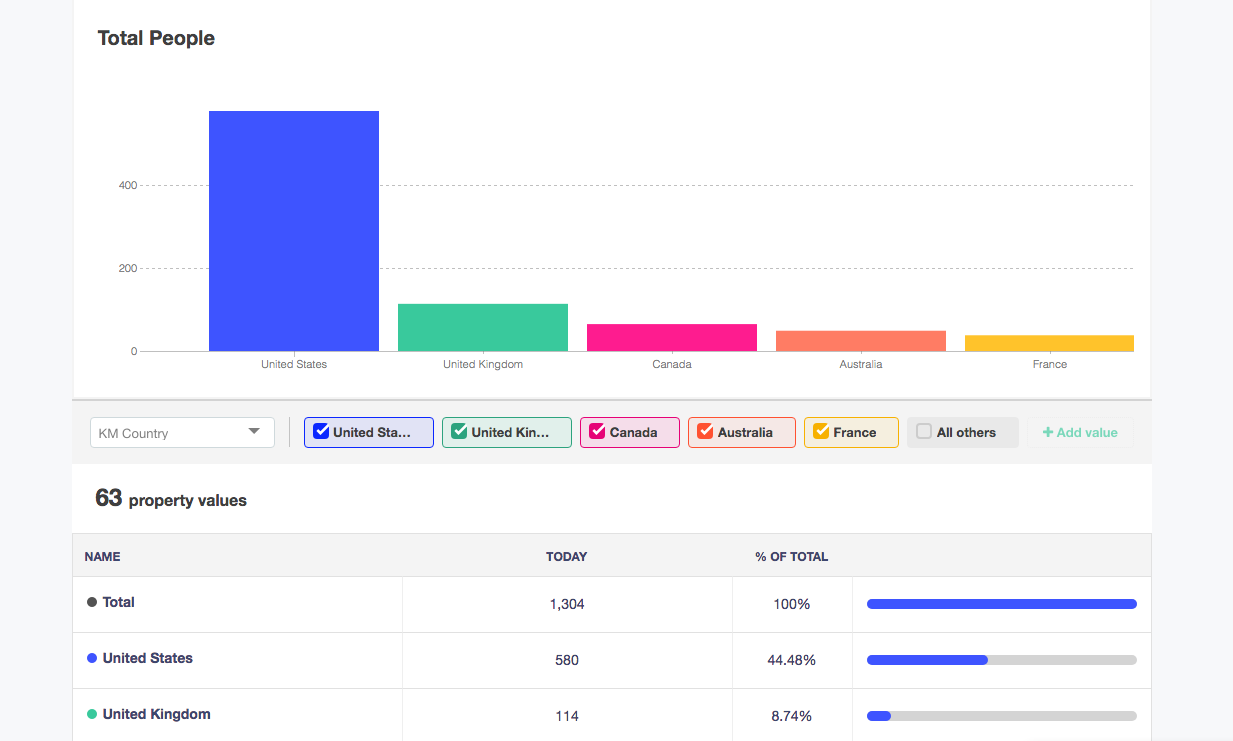
Kissmetrics is one of the best tools for ecommerce customer analytics. With a focus on funnel analysis, cohort tracking, and detailed customer insights, Kissmetrics enables brands to identify trends, reduce churn, and improve conversions.
Key features:
- Customer Journey Analysis: Tracks individual user paths, from first interaction to purchase, helping ecommerce companiesidentify bottlenecks in the sales funnel.
- Funnel Reports: Provides clear visibility into where customers drop off in the conversion process, enabling targeted optimizations to improve performance.
- Cohort Analysis: Analyzes customer behavior over time, helping brands understand retention patterns and design strategies to improve lifetime value (LTV).
- Revenue Tracking: Links user actions to revenue generation, offering insights into the most profitable customer segments and campaigns.
- Segmentation Tools: Enables online businesses to segment users by behavior, demographics, or purchase history, ensuring more personalized marketing efforts.
- Integrations: Connects seamlessly with ecommerce platforms, CRMs, and marketing tools for unified data analysis and streamlined reporting.
9. Crazy Egg
Best for: Diagnosing usability issues, implementing effective design changes, and delivering seamless customer experiences

Crazy Egg is a website optimization and user behavior analytics tool that provides ecommerce businesses with detailed insights to enhance website performance. Crazy Egg enables brands to identify friction points, test design variations, and make data-driven improvements to optimize the shopping experience and boost conversion rates.
Key features:
- Heatmaps: Provide detailed visualization of where users click, scroll, and hover, highlighting high-performing areas and overlooked elements on product and checkout pages.
- Session Recordings: Crazy Egg allows businesses to replay real user sessions to understand navigation patterns, pinpoint barriers like confusing interfaces or broken elements, and identify opportunities for smoother customer journeys.
- A/B Testing: Offers tools to test variations of page designs, including product descriptions, CTAs, or image placements, enabling brands to determine the most effective layout for driving conversions.
- Scroll Maps: Crazy Egg highlights how far users scroll on key pages, such as category or product pages, ensuring that important content and CTAs are strategically positioned for maximum visibility.
- Error Tracking and Diagnostics: Detects broken links, non-responsive elements, or slow-loading pages that disrupt the user experience. Fixing these issues can reduce bounce rates and improve overall site performance.
- Customizable Reports and Insights: Generates actionable ecommerce insights that brands can use to continuously refine their website, including identifying underperforming pages or content.
- Visitor Segmentation: Analyzes user behavior by segment, such as first-time visitors versus repeat buyers, helping tailor experiences to different customer types.
10. HubSpot
Best for: Brands looking for a single solution for ecommerce analytics and automation capabilities.
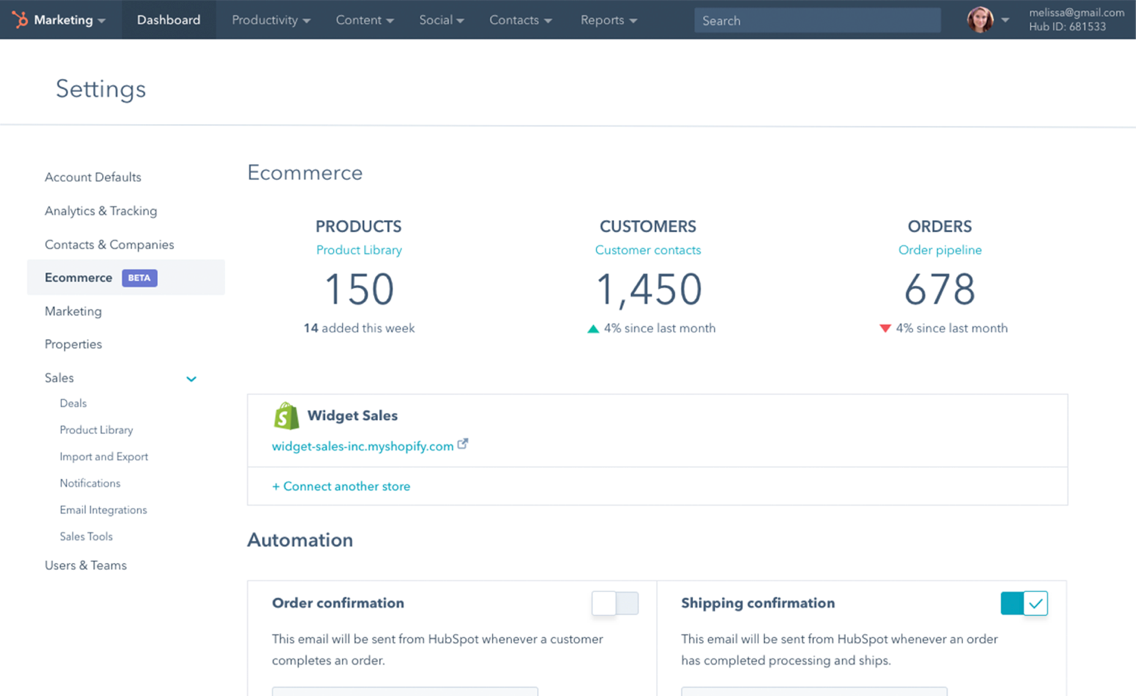
HubSpot offers a comprehensive suite of solutions, including ecommerce performance analytics tools to track and analyze customer interactions across the entire buyer’s journey.
Ecommerce-specific features:
- CRM and Ecommerce Integration: HubSpot syncs seamlessly with ecommerce analytics platforms like Shopify, allowing businesses to track customer interactions, purchase history, and lifecycle stages within a user-friendly dashboard.
- Attribution Reporting: Hubspot provides detailed insights into which marketing efforts, from email campaigns to paid ads, drive the most revenue, helping optimize ad spend and marketing strategies.
- Customer Behavior Analytics: Tracks user behavior such as email engagement, website visits, and cart activity, enabling ecommerce brands to personalize marketing and improve customer experiences.
- Marketing Automation: Automates workflows like cart abandonment emails and follow-up communications, improving conversion rates without manual effort.
- Sales Performance Tracking: Hubspot is also a sales analytics tool and helps monitor sales metrics like deal size, revenue generated, and pipeline progress.
- Customizable Dashboards: Builds tailored reports for tracking ecommerce-specific KPIs such as average order value (AOV), customer lifetime value (LTV), and purchase frequency.
11. Adobe Analytics
Best for: Ecommerce business analytics in large brands.
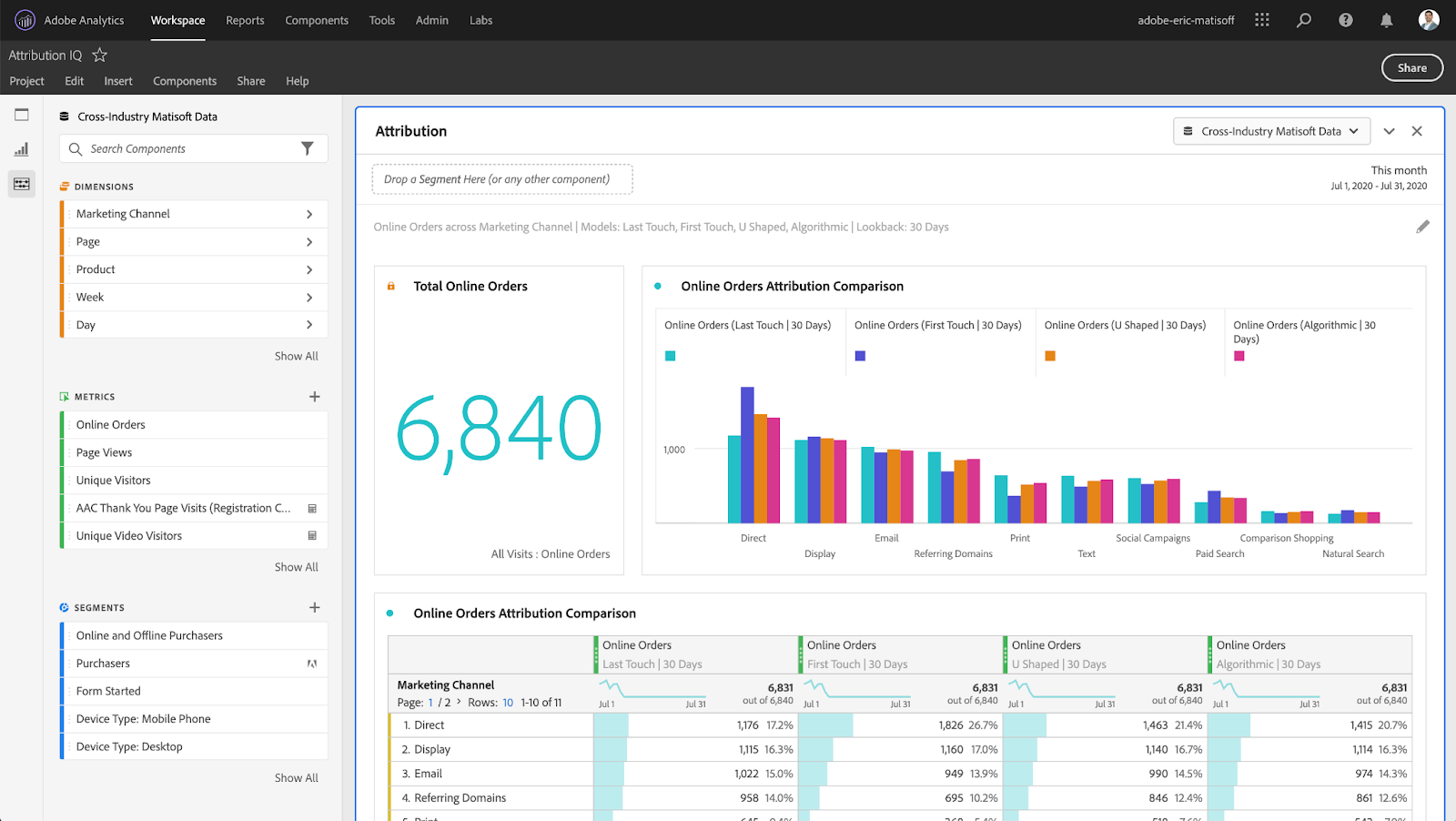
Adobe Analytics is a general-purpose solution that also excels as an ecommerce data analytics tool. Its advanced capabilities provide deep insights into customer behavior, enabling brands to understand the complete customer journey and optimize performance across all digital touchpoints.
Adobe Analytics ecommerce-specific features:
- Comprehensive Customer Journey Analysis: Tracks interactions across websites, apps, and other channels, providing a unified view of customer behavior to optimize touchpoints and boost conversions.
- Real-Time Data Processing: Adobe Analytics delivers instant ecommerce insights into visitor activity, such as cart additions, product views, and purchases, allowing businesses to respond quickly to emerging trends or issues.
- Advanced Segmentation: Enables detailed segmentation of customers based on behavior, demographics, or purchase history, supporting targeted marketing efforts and personalized experiences.
- Attribution Modeling: Provides customizable models to understand which channels and campaigns contribute the most to conversions, helping allocate ad spend effectively.
- Predictive Analytics: Adobe Analytics uses AI to forecast customer behavior and revenue trends, enabling proactive decision-making to capitalize on growth opportunities.
- Customizable Dashboards and Reporting: Offers flexible reporting options tailored to ecommerce KPIs like conversion rates, average order value (AOV), and customer lifetime value (LTV).
12. Shopify Analytics
Best for: Essential analytics tool for ecommerce brands present on Shopify, helping refine strategies, improve online shopping experiences, and boost overall store performance.
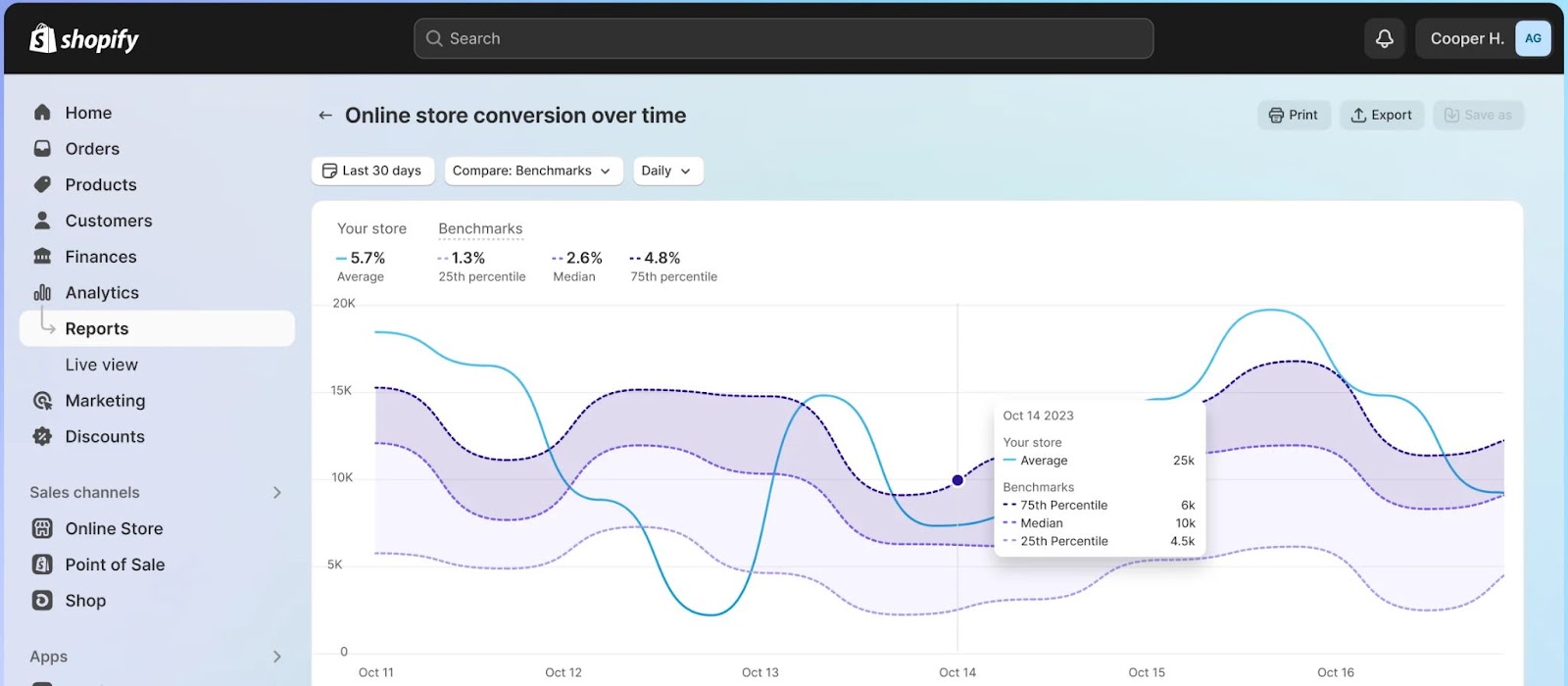
Shopify Analytics is an integrated ecommerce analytic tool designed specifically for businesses using the Shopify platform. It provides detailed insights into sales performance, customer behavior, and store operations, enabling merchants to optimize their ecommerce strategies and drive growth.
Key features:
- Sales Reports: Shopify Analytics offers detailed reports on sales by product, location, and time period, helping businesses identify top-performing items and optimize inventory management.
- Customer Behavior Insights: Tracks metrics like returning customer rate, average order value (AOV), and lifetime value (LTV), providing a deeper understanding of customer engagement and retention.
- Marketing Analytics: Shopify Analytics measures the impact of campaigns, including referral traffic, conversion rates, and sales generated, enabling more effective allocation of marketing budgets.
- Real-Time Reporting: Provides up-to-the-minute data on store performance, including live views of customer activity and sales trends.
- Custom Reports: Allows merchants to create tailored reports based on specific KPIs, offering flexibility to monitor what matters most.
- Financial Reports: Shopify Analytics tracks metrics like gross profit, taxes, and refunds, helping online stores stay on top of their finances.
13. Daasity
Best for: Data orchestration and analytics tailored for mid-market DTC ecommerce brands.
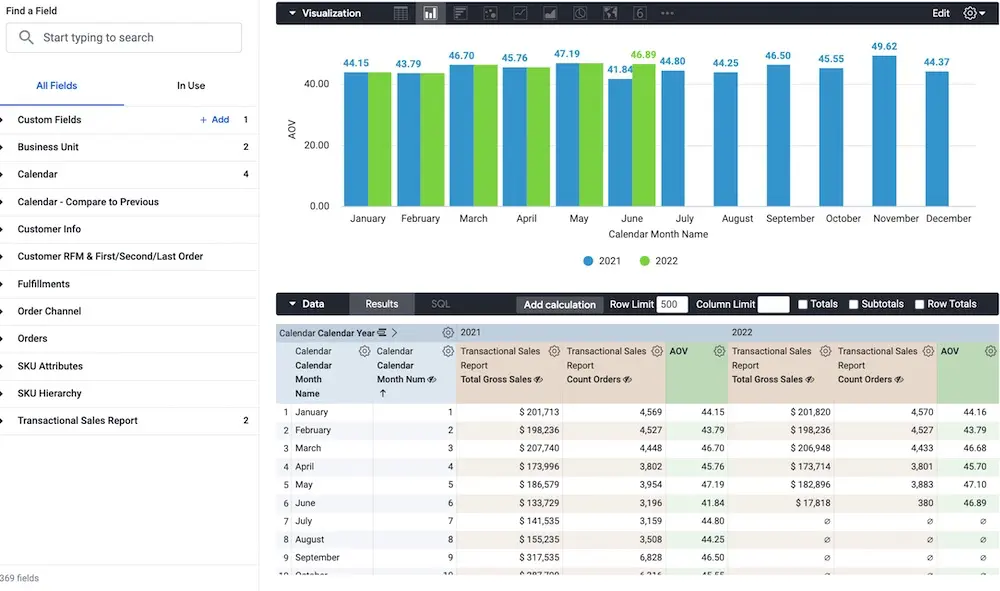
Daasity is a data analytics platform specifically designed for ecommerce brands, enabling seamless integration of data from various sales channels, marketing platforms, and operational tools.
Key features:
- Centralized Data Integration: Daasity consolidates data from ecommerce platforms like Shopify, Magento, SPINS, and BigCommerce, as well as marketing tools and ad platforms, into a single platform for unified analysis.
- Customer Segmentation: Advanced segmentation tools help brands identify high-value customers, track churn risk, and create targeted campaigns to maximize engagement and retention.
- Performance Benchmarking: Daasity helps brands compare key metrics like average order value (AOV), customer acquisition cost (CAC), and revenue across multiple channels to identify opportunities for growth and efficiency.
- Automated Reporting: Schedule and generate reports tailored to multiple ecommerce use cases, including customer retention, demand forecasting, inventory optimization, and others.
- Multi-Channel Attribution: Provides clear visibility into the performance of marketing campaigns across different channels, ensuring accurate ROAS calculations and better budget allocation.
14. Triple Whale
Best for: Consolidating advertising and profitability data for Shopify-based small to medium DTC brands.
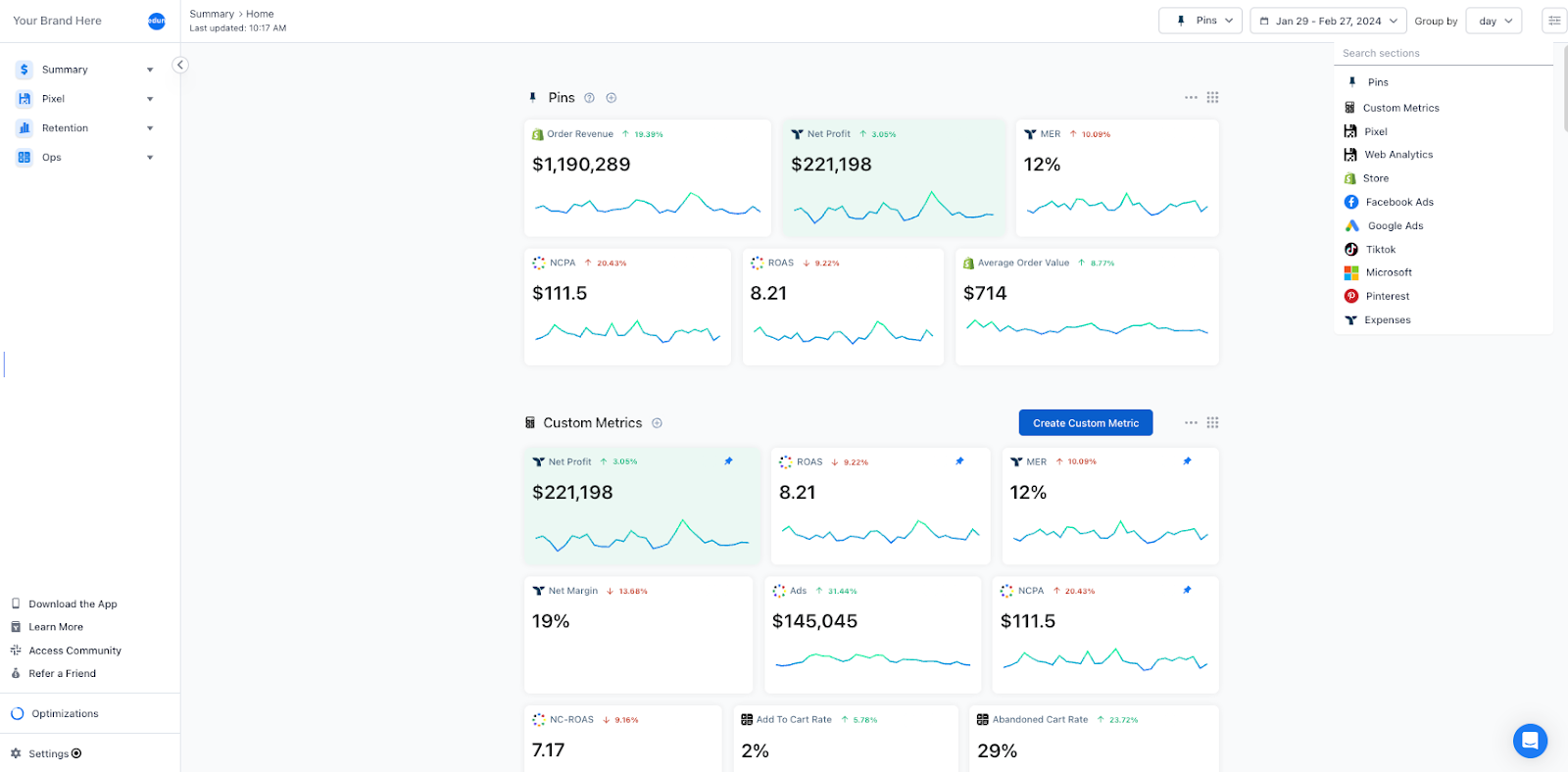
Key features:
- Centralized Dashboard: Triple Whale offers over 30 pre-built integrations and combines key metrics like ad spend, ROAS, AOV, and customer retention rates from multiple marketing channels into a single interface, eliminating the need for manual reporting.
- Customer Lifetime Value (CLV) Insights: Uses advanced algorithms to predict future customer behavior and CLV based on historical purchasing patterns, enabling precise segmentation and retention strategies.
- Attribution Tracking: Offers multi-touch attribution models to identify the most impactful marketing channels, campaigns, and touchpoints, ensuring optimal budget allocation.
- Profitability Analytics: Breaks down profitability by campaign, product, or customer segment, integrating data on ad costs, operational expenses, and taxes to provide a full financial picture.
- Customizable Alerts and Automation: Triggers alerts for significant fluctuations in KPIs like CAC, ROAS, or inventory levels, allowing immediate corrective action to safeguard profitability and performance.
- Ad Creative Performance Monitoring: Analyzes ad creatives at a granular level, identifying which visuals, headlines, or offers drive the highest engagement and conversions.
Top Ecommerce Analytics Platforms at a Glance
| Tool | Best for | Core function | Key features |
|---|---|---|---|
| Google Analytics (GA4) | Tracking user behavior across web/apps | Web and ecommerce performance analytics | Event-based tracking; ecommerce reporting; audience segmentation; predictive metrics; cross-platform insights |
| Improvado | Unified marketing and ecommerce data insights | Data aggregation, normalization, and analytics enablement | 500+ integrations; automated ingestion; transformation and standardization; governance and monitoring; BI-ready datasets and dashboards |
| Glew | Product and customer behavior optimization | Ecommerce BI and analytics | Customer segmentation; product performance; profitability analysis; automated reporting; multi-platform integrations |
| Mixpanel | Behavioral funnels and retention analytics | Product and user journey analytics | Funnels and cohorts; retention tracking; event analytics; user segmentation; customizable dashboards |
| Woopra | Customer journey and retention analysis | Real-time customer analytics | Journey mapping; real-time analytics; behavioral segmentation; retention analysis; integrations with marketing tools |
| Optimizely | Testing and personalization to improve conversion | Experimentation and optimization | A/B and multivariate testing; audience targeting; experimentation analytics; personalization workflows; integrations |
| Hotjar | Qualitative UX insights | User behavior visualization and feedback | Heatmaps; session recordings; on-site surveys; funnel and form analysis; feedback widgets |
| Kissmetrics | Customer lifecycle and revenue analytics | Customer behavior and funnel analytics | Journey tracking; cohort analysis; funnel reports; segmentation; revenue attribution |
| Crazy Egg | UX diagnostics for conversion improvements | Visual behavior analytics and testing | Heatmaps; scroll maps; session recordings; A/B testing; page-level insights |
| HubSpot | CRM-led marketing and sales reporting | CRM analytics and automation reporting | Attribution reporting; lifecycle tracking; campaign reporting; marketing automation analytics; sales performance dashboards |
| Adobe Analytics | Enterprise-grade customer and commerce analytics | Advanced digital analytics and journey reporting | Advanced segmentation; real-time reporting; customizable workspaces; cross-channel analysis; predictive insights |
| Shopify Analytics | Shopify store performance tracking | Native ecommerce reporting | Sales and conversion reports; customer reports; product performance; real-time dashboards; custom reporting (plan-dependent) |
| Daasity | DTC performance reporting across tools | Data integration and ecommerce reporting | Centralized data connectors; KPI reporting; segmentation; benchmarking; automated reporting |
| Triple Whale | Shopify-focused attribution and profitability visibility | Attribution and profit analytics | Unified performance dashboard; attribution views; LTV and cohort reporting; profitability tracking; alerts |
How to Choose the Right Ecommerce Analytics Tool
Selecting the right tool from this list can feel overwhelming. The best choice depends entirely on your unique business needs, resources, and goals. Follow this structured approach to make a confident decision.
Step 1: Assess Your Business Size & Stage
Your company's maturity plays a huge role:
- A startup on Shopify may only need Shopify Analytics and a free GA4 account to get started.
- A mid-market DTC brand might need a more robust solution like Glew or Triple Whale.
- A large enterprise with a dedicated analytics team will require the power and flexibility of Adobe Analytics or a custom solution built with Improvado.
Step 2: Define Your Key Business Questions
Don't start by looking at features. Start by listing the most important questions you need to answer.
Are you trying to fix a low conversion rate?
Do you need to understand customer lifetime value?
Is proving marketing ROI your top priority?
Your questions will point you toward the right category of tool. For example, if conversion rate is the problem, a tool like Hotjar or Optimizely is a great place to start.
Step 3: Evaluate Your Technical Resources
Be realistic about your team's technical skills. Some tools, like Adobe Analytics, require significant expertise to implement and manage.
Others, like Glew or Triple Whale, are designed to be more plug-and-play. If you don't have an analyst on staff, look for tools with pre-built reports and intuitive dashboards.
Step 4: Consider Your Existing Tech Stack
Your analytics tool must integrate with the platforms you already use. Make a list of your essential tools: ecommerce platform, ad networks, email provider, helpdesk, etc.
Check the integration library of any tool you're considering to ensure it can connect to your critical data sources seamlessly.
Implementing Your Analytics Tool for Maximum Impact
Buying a tool is just the first step. True value comes from proper implementation and consistent use. To get the most out of your investment, focus on creating a data-driven culture within your organization.
Setting Up Accurate Tracking
The old adage "garbage in, garbage out" is especially true in analytics. Ensure your tracking is set up correctly from day one.
This means implementing tracking codes properly, setting up conversion events, and ensuring data consistency across platforms. Work with a developer or implementation specialist if needed to get this right.
Creating Actionable KPI Dashboards
Don't get lost in a sea of metrics. Work with your team to identify the Key Performance Indicators (KPIs) that matter most for each department. Then, build dedicated KPI dashboards that display this information clearly.
The goal is to provide at-a-glance insights that anyone in the company can understand and act upon.
Fostering a Data-Driven Culture
Data should be part of everyone's job. Encourage teams to use data to support their decisions. Start meetings by reviewing relevant dashboards. Celebrate wins that were achieved through data-backed insights. When data becomes a shared language, the entire organization becomes smarter and more agile.
The Future of Ecommerce Analytics: AI and Automation
The world of ecommerce analytics is constantly evolving. The next frontier is driven by artificial intelligence and automation, which are transforming how brands use data to gain a competitive edge.
Predictive Analytics for Demand and Revenue Planning
Historical sales data is no longer used only for trend reporting. AI models now forecast product-level demand, revenue trajectories, and promotion impact before campaigns launch. Predictions account for seasonality, price changes, competitor activity, and media pressure.
These forecasts drive inventory allocation, fulfillment planning, and budget distribution. Overstock and stockout risk can be identified weeks in advance. Marketing calendars align with projected buying windows, not past behavior.
Predictive scoring is also applied at customer level. Models estimate repurchase probability, churn risk, and future order value. This guides retention campaigns, loyalty incentives, and audience prioritization in paid media.
AI-Powered Insights and Anomaly Detection
Manual analysis does not scale with modern ecommerce data volumes. AI now monitors performance across products, channels, and regions continuously.
When anomalies occur, such as a sudden drop in checkout conversion or a spike in refund rates, systems generate alerts with context. The underlying drivers are explained, not just flagged. This reduces time spent diagnosing issues and prevents revenue leakage.
AI also uncovers non-obvious relationships. For example, identifying product combinations that drive higher lifetime value, or promotion patterns that increase basket size. These insights feed merchandising, bundling, and cross-sell strategies.
Automated Reporting as a Continuous Intelligence Layer
Reporting is shifting from static dashboards to automated intelligence delivery. Instead of building reports manually, teams receive scheduled performance summaries tailored to role and responsibility.
Executives receive revenue and margin views. Growth teams receive channel efficiency and conversion funnels. Merchandising teams receive product-level demand signals. All reports run on the same governed dataset.
This eliminates repetitive report building and version conflicts. Analysts focus on strategic modeling and experimentation, not data assembly. Everyone operates from current data without logging into multiple platforms.
Conclusion
Ecommerce growth now depends on how quickly teams can turn data into action. Fragmented platforms, manual reporting, and inconsistent metrics slow decision-making and hide profit opportunities. Modern ecommerce analytics requires unified data, automated pipelines, and real-time insight delivery.
Improvado provides the data foundation to make this possible. It connects ecommerce, advertising, analytics, and revenue systems into a single governed dataset, automates reporting, and powers AI-driven analysis through natural-language interaction. This allows teams to focus on optimization and growth instead of data assembly.
To see how Improvado can modernize your ecommerce analytics stack, schedule a demo.
.png)





.png)
